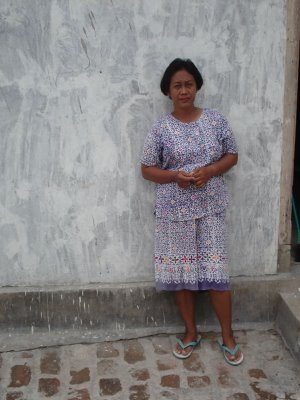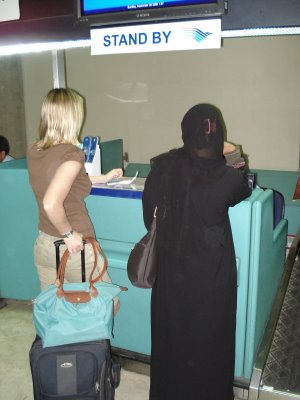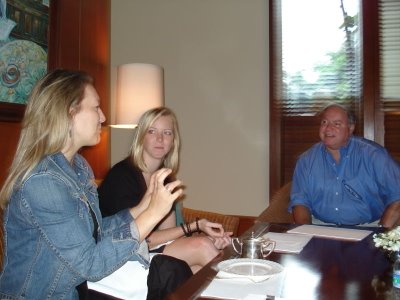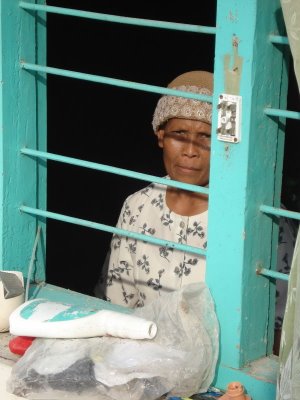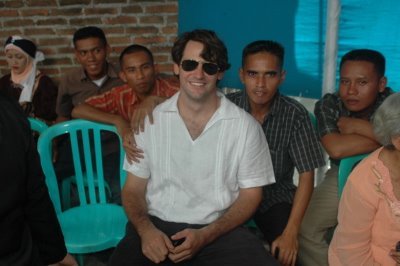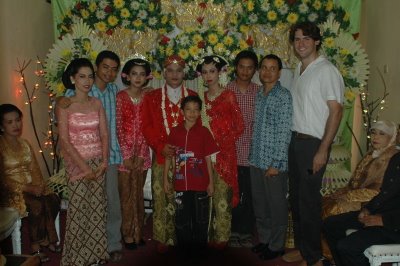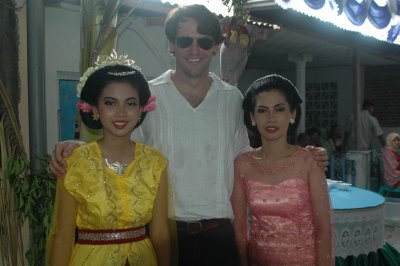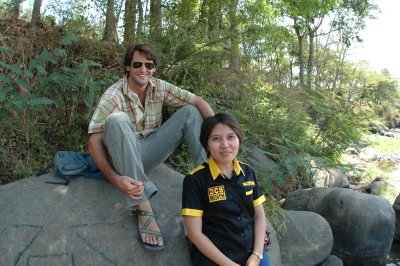A few weeks ago, a bit of reality crept into my life in Indonesia. Up to that point, most of my time here had been blissfully devoid of any real long-term responsibility. Between travel, teaching, having laptops stolen, and working with my microfinance team, I was hard pressed to focus on any sort of timeframe longer than a few days in the future. When my Aunt Rose e-mailed asking when she should buy tickets, since she only had six weeks left to do so, I told her to chill out – jam karet, babe. However, while grazing through the shelves of books at one of Solo’s English language book stores, it dawned on me that I needed to start making plans for after the Fulbright year ends in June. Staring down the rigid, foreboding cover of the GRE sent me through a spin, albeit a short lived one. Facing the prospect of the real world, I reckoned that grad school wasn’t a bad alternative. As an inveterate slacker of sorts, staying with my head stuck in the books for three more years sounded like a great way to round off my ten months in Indo.
So, the day before Thanksgiving, I left on the train out of Solo, Central Java headed for Jakarta. The plan was to take the Graduate Record Examination (GRE) the next day, and then to meet up with some friends for Turkey Day festivities (read: turkey and booze sans turkey). Not at all too thrilled about spending what is by far and away my favorite holiday with a bunch of State Department stiffs in nearby Surabaya for U.S. consular holiday making, I decided to cut my losses and make a little adventure of the test taking rigmarole. The Javanese train system is admired as one of the finest in Asia, and I wanted to give it a shot myself.
The recent proliferation of cheap, safe and high-quality airfare in Indonesia (and the rest of the world) has begun to give the long-distance train market the air of obsolescence that seems to nip at the industry’s heels in both developed and developing nations. Unlike most other things in Indo, the trains actually run on time, if not slightly ahead of schedule. Slightly frumpy train attendants – for lack of a better phrase – dressed in day-glo blue and orange form fitting uniforms dole out pre-boxed meals of luke warm rice and stale potato patties. I was more than happy to spend the day gently swaying from side to side through endless miles of arid cassava fields and rice paddies, crossing over rocky river beds and shabby terracotta hamlets via late 19th century era trestles, stopping momentarily at rural waypoints, where middle-aged ibus in their ubiquitous teddy bear pajama uniforms and flip-flops ply their goods while waddling down the train’s aisle.
As the train sped from rural vistas of brown and burnt fields through dry mountain dells across flat and expansive plains into Jakarta proper, the assorted hallmarks of one of the world’s biggest developing cities became visible through the spider web patterned cracks running across many of the coach’s windows. The slums, shantytowns, mosques, rivers of garbage, grease slicked paddies, slick new housing developments, massive energy and telcom infrastructure, soccer fields of red packed dirt, bench presses with weights made from cement-filled buckets, novels worth of graffiti, and of course, thousands of people from various emerging walks of life on their temporarily muted buzzing and humming motorbikes.
As we pulled into Jakarta, Mr. Bean was interrupted during one of his skits courtesy of “Show on Rail TV,” which had previously been sporadically interspersed with gory advertisements recommending that people heed traffic laws at railroad crossings. I couldn’t figure out who was more grim – Mr. Bean with a tea kettle stuck on his fist, or the small, gray haired man on the TV adds preaching safety and prudence to the backdrop of Muslim chants, clanging bells, and animated gore splattering the screen.
Coming back to Jakarta really does feel to a certain extent like returning home, or at least returning to a place full of fond memories and good friends. Despite the Fulbright officials’ warnings that Jakarta is not Indonesia and Indonesia is not Jakarta, this city in many ways does embody a broader image of Indo. Like any megacity in the world, it harnesses all possible iterations of the human experience – all the hope, optimism, fear, and sadness of a nation, distilled into a bubbling and throbbing mass of wonderfully semi-ordered anarchy.
I got off the train at Gambir, Jakarta’s main hub, and quickly realized that I was right back in the thick of it. No more timid and refined East Javanese villagers, but instead the barked cries of “Hello, Mister! Where you go?” or “You want transport?” hollered with the authority of someone who has been standing in the same place for three years. I descended into the maelstrom of the main atrium, and after exchanging nods with the presiding Polisi Militer, beelined for the Dunkin Donuts – the first franchise I had seen in nearly a month. I ordered a coffee, and let the cashier peer pressure me into an almond donut. I devoured the two meditatively as I watched pretty women with babies, ugly men with no arms, and every iteration of civilization in between pass outside the store’s plate glass windows. I was back.
After my donut disappeared, I made my way out of the station, directly across the street from the national monument, where I previously spent hours and hours on lazy Sunday afternoons walking and talking with people of all stripes. Now, on a late Wednesday afternoon, the monument was empty, save for a few soldiers jogging around the perimeter. The monument is a large and verdant park with a focal point of a massive spire topped with some obscene amount of gold leaf shaped into an enduring torch of freedom or some such nonsense. It was constructed by Sukarno late in his reign, and playing off of the old man’s renowned sexual proclivities, is commonly and comically referred to as “Sukarno’s Last Erection.” I had always been tempted to climb – or ride the elevator, as the case may be – up to the top of the six hundred foot tall unit, but the weekend lines deterred me every time. Now, with the park empty and closing time at hand, I took a leisurely stroll over to the base of the marble monstrosity, where I managed to convince the frumpy female guard with bright red lipstick smeared across her lips and most of her palate to let me through despite it being past closing time. In exchange for her good graces, I was supplicated by her and her male entourage of armed guards for kisses upon leaving, but pretended not to understand. Gross.
After riding the elevator up to the observation deck, I spent a solid hour staring out over the seemingly infinite expanse of Indonesia’s capital city. The Grand Mosque, fifth largest in the world, and its neighbor, Indonesia’s biggest protestant church; the national headquarters for Pertamina, Indo’s oil and natural gas conglomerate; the President’s residence; the U.S. embassy; the national museum; the Javanese Sea visible on the gray, smoggy horizon; and off only a few blocks away, the Hotel Aryaduta, where my great big Indonesian adventure started nearly four months ago.
Attracted as if by some gravitational pull, I descended the Erection and wandered through rush hour traffic until, panting, sweating and covered in the airborne effluence of nearly fifteen million inhabitants, I found myself in the pristine, air conditioned lobby of the place that I called home for over four weeks. The intermingling of dozens of accents and languages was welcomed music to my multicultural sensibilities. Madiun is certainly exotic, but it’s anything but diverse. I never would have thought that being in a room with a Swiss banker, the International Herald Tribune, and a hummus and grilled vegetable panini was the recipe for bliss, but after a swim, a steam room, and another locker room encounter with the flamingly gay Jakartan who attempted to seduce me while I was changing back in August, let me tell you, it was.
While we were staying amidst the four-star splendor of the ‘Dute, room prices were a common Fulbright ETA topic of conversation. It never dawned on me to ask the price of a room while I was there, but now that I needed a place to shack up for the night before taking the GRE, I approached the counter and asked. “Our most affordable room is 550,000 Rupiah, Sir.” Krikey. That’s over sixty bucks. I didn’t even bother to ask about the rooms where we had stayed, which were a step above the most affordable option. All I could mutter was, “Thanks, Uncle Sam.”
Leaving the ‘Dute, I asked Fredie, one of the resident doormen, about recommendations. “Ah, the Formula One is new and cheap, Sir, and is close to where you will be taking your test.” Peachey, thanks Fred. Fredie had remembered me when I entered the building earlier in the afternoon, and throughout my brief stay in the lobby and fitness center, a handful of employees approached me to ask about my health, how teaching was going, and how my various comrades were faring at their respective sites. I felt ashamed that these people knew so much about me, but I couldn’t even place their faces. It certainly felt nice to be remembered, but it was also a lesson in the futility of trying to keep low key.
I followed Fredie’s advice, and a ten minute taxi ride later found myself at the race car-themed Formule1 Hotel – with an “E”, that’s right. The fluorescence was sub-optimal, but the twenty-six dollar price tag would have to suffice, and I was hoping that the beds would be shaped like race cars. Awesome! While the room was clean, new, and adorned with a foot-wide yellow racing stripe over the bed, unfortunately there was no other heyday of racing accoutrement to be found. I consoled myself with several English language publications and a vocab cramming sesh, and drifted off to sleep with images of Miss Sklerew, my octogenarian SAT proctor, zipping around my bed cum test taking station in a 1960s era roadster.
I thought that Jakarta was a pretty grim place my first time here. Nothing, however, compares to the grimness of the megapolis’s city streets after a nice filth generating downpour courtesy of the musim hujan, the rainy season. My first stop was the hotel’s “lobby,” in essence a quasi-guarded door to the street juxtaposed with one of Jakarta’s scores of Starbucks. Even – or maybe especially – at 7AM, the omnipresent chiming of instant message alerts echoed across the hum of caffeinated conversation. A venti latte and toffee muffin in hand (and three bucks later; who honestly pays American prices for coffee in Indonesia? Apparently I as well as hundreds of thousands of yuppified Jakartans do. Somehow that brilliant corporation has branded themselves so well that people buy their sub-standard coffee for up to one hundred and fifty times the street value! It’s just absurd, and absolutely brilliant.) I headed out on to the streets.
I decided to walk from Formule1 to the test center in order to get my blood and gall circulating proper like. The only gall that I successfully generated was the type that comes out of stray dogs and waterborne rats, and in any case, that wound up all over my shoes. Wading over open air cesspools, crossing through muddy construction sites, and leaping over exposed, inestimably deep holes in the sidewalk, I made my way past the Four Seasons out of the posh Kuningan district and into the heart of downtown Jakarta. I expected the Menara Imperium, my GRE location, to be some sort of squat cement complex surrounded by black water and garbage filled moats, similar to so many of the buildings that make up this city. Instead, I was treated to the luxury of a thirty-eight story gleaming edifice of marble and modernity. After another highly caffeinated coffee beverage in the building’s lobby, I made my way up to the twenty-eighth floor. In the elevator, I was surrounded by men and women in ties and skirts. Minus my being the only white person in this building, I could be in any elevator in the world, I thought to myself.
Per usual, jam karet applied in full, and although I had been told to show-up at 8:30AM, no employees appeared until minutes before 9:00, when the test was scheduled to start. In the interim, I struck up a conversation with the only other person in the marble-lined foyer, an attractive twenty-something year-old Indonesian woman, dressed as if she were going to work at some fashionable banking house, not take some lowly standardized test. It turns out that Agni was applying for the exact same schools and programs that I am interested in, namely international development and public policy. As another prototypical Indo coincidox, she was also working in Aceh, where I had spent several weeks on my first trip to Indonesia. Furthermore, the daughter of the parliamentarian from the district that neighbors Madiun, she was born in Indonesia, but raised in Ithaca, New York, where my brother is currently going to college at Cornell. She has studied conflict management in Sweden, and (just when the story gets spicy) she is getting married to an Australian employee of the World Bank in April.
As I sweated bullets through the test – was it supposed to be this hard? – I kept thinking of my competition, seated right next me, divided only by a flimsy cubby. Here we were, from two complexly different and simultaneously similar worlds, taking the exact same test, applying for the exact same programs at the exact same schools. If this isn’t an example of the triumph of globalization, I don’t know what is.
As the three hour computer adaptive test came to an end, I was presented with the choice of canceling my scores, or viewing them instantly. I wavered over the former, concerned with how difficult I found some of the sections, but ultimately, after thinking of the pain in the ass it was to get here – and the $150 test fee – I clicked accept. Completely surprised by how well I had done, I let out a big “HELL YEAH!” and did a full double fist pump while jumping to my feet and knocking over my chair. Way to go, you big, goofy American. Meanwhile, Agni had surreptitiously snuck out of the room, and was waiting for me in the lobby.
Riding high on our recent victories over the standardized machinations of doom, we walked twenty minutes to a nearby Indian restaurant that Agni swears by. Over lassies and simosas, I was overjoyed to speak proper, non-dumbed down, culturally common English with someone who fully grasped the Indonesian perspective, not from a position of temporary contemplation, like mine, but from an irreversible lifetime bond. I hope to see her around Harvard/Hopkins/Columbia/Cornell next year.
Agni and I parted ways – she had to go order her wedding invitations. Before she left though, I asked her for a recommendation as to where I should get my hair cut. Torn between supplications from an ex-girlfriend to regrow my ponytail and the more pressing urgings of my surrogate mom to shear it all off, I was finally caving to Bu Nana’s constant criticism of my shaggy appearance. After a few hours of interneting and another Starbucks hit, I made my way to Plaza Indonesia, one of Jakarta’s biggest malls, and home to several of the city’s most posh female hair salons. Thanks, Agni. For thirteen bucks – an exorbitant sum to pay for a haircut, even by some American standards – I was given the all-star treatment. After informing the receptionist – I kid you not, there was a front office and a very fashionable woman working there – that I wanted a potong rambut, freshly scented pretty ladies whisked me off to the rear chambers, where my mane was cleaned, shorn, and styled.
Halfway through my overhaul, I received a text message from Nelly, the AMINEF-Fulbright co-coordinator and general bearer of bad news. “Nick, I hear you are in JaKARta. You should come to Donna’s house for turkey dinner. Nelly.” Well, if that just wasn’t a splendid offer. I had run away from East Java in an attempt to avoid the State Department types in Surabaya, but after spending the day surrounded by the decadence of contemporary consumer culture and standardized tests, I was starting to revel in the thought of sharing my evening with the centuries-old traditions of gluttony and merrymaking.
After my salon session, looking like the respectable Marine that I always wanted to be, I was ready for the Jakarta embassy crowd and the Thanksgiving festivities that they would be providing. I met Nelly in the lobby of the Dharmawangsa, purportedly Jakarta’s most expensive hotel, where John and I had attended the reception for the Versailles-like wedding back in August (see post). It was a short walk from there to the AMERICAN CLUB, a two-block-square compound consisting of a miniature country club surrounded by the houses of Jakarta’s more prominent American officials and mid- to long-term guests.
Nelly, a self-purported gossip, gave me all the dirt on the other ETAs – unfortunately, there really isn’t anything too exciting, at least not yet. (NB: Last year two of the nine female ETAs got knocked-up over the course of the year. Rumor has it that one of them recently gave birth in the U.S., but that Nelly made the executive decision to deny the would-be father an American visa. I’m just waiting for the day when this year’s version of such a scandalous newsflash comes tearing down the ETA text message chain of command. I’ve got bets going with myself to see who the first one will be…). We arrived at the compound, a fifteen-foot tall metal and cement wall topped with barbed wire, and Nelly greeted one of the guards with, in Bahasa Indonesia, “Well oh my, Pak, aren’t you looking FAT!” Just one example of the cultural callousness that may have eventually led the female ETAs to seek the sanctuary of an illicit affair – I’m not condoning the act(s), but I can understand that the impulse comes from more than just a heightened and under-exercised libido. But I digress.
Inside the gates, Nelly and I were greeted by a chirpy pair of Fulbright grantees – not in the ETA program – who made savage attempts at telling Nelly comic anecdotes in Bahasa Indonesia. Let’s just get inside the house and do what we came here to do, ladies. While waiting at the door for what seemed like twenty minutes, I zoned out on their conversation about taxis, and made a visual inspection of the place. Inside the compound, neat and spacious one story houses surrounded the country club core. Each house had its own garage, garden and screened-in porch. The houses and gardens all seemed to run together, and it seemed if, especially considering the type of people whom I had met at the embassy, privacy and personal space might be issues.
Donna, a regional officer of some sort (and evidently a big-enough-wig to merit a government funded house), eventually came to the door and welcomed us into her home. The first thing I noticed was the mouth watering aroma of homecooked food. Now, I have eaten pretty damn well since coming to Indonesia. I may have lost a bit of weight, but that’s never such a bad thing. The food here is by and large delicious and plentiful, and wherever I go someone tries to shove some new snack or meat product down my throat. However, walking into that house and being bombarded by that aromatic mountain of olfactory goodness was like taking a space-warp to my Mom’s kitchen. I had visions of golden brown turkey, small geological formations of mashed potatoes and stuffing, caramelized carrots, big fat pumpkin pies, and all the other trappings of the best holiday ever. I was instantaneously happy with my decision to forsake my status of cool aloofness in favor of this veritable cornucopia.
Guests continued to arrive, a few of whom I actually knew, including two other ETAs. The awkwardness of random introductions was alleviated with the opening of beer and wine, as I simultaneously became more and more interested in the research of the other Fulbright Seniors, one of whom was looking at local legal reforms in Aceh. The food was brought out on large, steaming platters, but even the gnashing of perfectly cooked turkey couldn’t suppress the room bubbling with conversation. In a room full of good people, delicious food, and a sizeable wine collection, I may have been 3,000 miles and twelve time zones away from my family, but I was certainly giving thanks.


